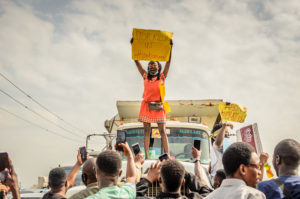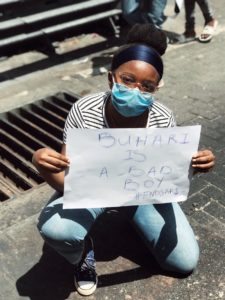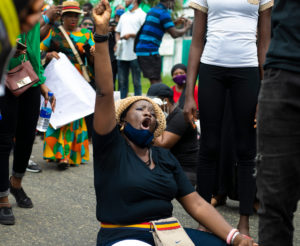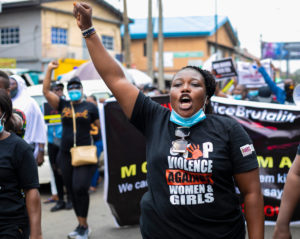It’s 4:29 am. Sunday 25th October 2020.
There is a part of me that wants to believe that everything that happened to the Benin [city] women in this movement to #ENDSARS is a joke. A dream. There is a part of me that wants to believe that three Benin women were raped by fellow protesters at an #ENDSARS protest and we did not stop the world. Rather we went into a dance of mindful forgetfulness saying it was thugs. Saying it was hoodlums. Saying it was people-sent-by-the-government-to-disrupt-the-protests.
There is a part of me that wants to ask if a woman’s battered, bruised and abandoned body has ever known the difference between thugs and SARS officials and market men and pastors and and and. Yesterday I was listening to an interview Titilope Sonuga gave about her poetry collection titled This Is How We Disappear. It is a collection that explores the disappearance of the Chibok Girls in particular. She said in one of the poems.
“It took three weeks for us to get the names of the girls kidnapped at Chibok. Michelle Obama holds up a placard asking for the girls. When we asked for the names of the girls kidnapped in Chibok, all the Nigerian women raped and murdered across the country echoed back in unison”. (Slightly paraphrased).
Ever since this movement to #ENDSARS begun, I have asked myself numerous questions. I have wondered about the place of women in certain revolutions. I have observed with a mix of anger and betrayal the flippant manner in which women’s abuse and silencing goes unnoticed. The movement to #ENDSARS is one that essentially birthed a kind of revolution across the country. It is one that in the words of most Nigerian men, “goes beyond SARS to include a better Nigeria”.
Now is it really a better Nigeria for all?
For the past few weeks, I have come under immense attack on Twitter especially for stating my discomfort with the fact that this movement was not just sustained by women and feminists, it was one that saw even feminists throw other women under the bus and laugh along with misogynist Patriarchy FC men.
I however don’t want to focus too much on the dragging I received on Twitter for asking women why we dedicated so much energy into this cause. I don’t think I would ever understand why only a month ago, the general consensus on Nigerian feminist Twitter was that SARS was to men what men were to women. Only a month ago, people made dark humor jokes telling men to dress properly so as not to get harassed by SARS. Statements which men make to us as fact and not as humor of any sort.
Then, all of a sudden it was as though women went into a collective amnesia. Women who in the past had never come for an end rape protest were giving out the numbers of women who still made those dark humor jokes to men to be bullied. Feminist women were laughing with known misogynists who called another woman “an ugly black man”. Feminist women who are strongly opposed to men saying things like “Rape is wrong cause I have a sister and daughter”, were suddenly saying they would take injuries cause they had brothers and sons. Feminist women were saying to women who were uncomfortable with the fact that no women-centred movement had gained this level of attention to be quiet because “Now is not the time”.

When has it ever been a good time to address the misogyny of Nigerian women at the hands of the Nigerian law enforcement AND Nigerian men in general? When has it ever been a good time to point out that proximity to men and fighting for your “brothers and sons” does not guarantee that they would the same for you? Or to point out that most times women and girls face abuse from the very same men in our lives. Or to even point out that women stand a chance of being erased?
Or to ask people to interrogate why they know Fela Kuti before they know his mother Funmilayo Ransome-Kuti? Or just to ask why even when feminist-minded women birth sons and are thrown down from buildings in the defence of these sons, these men write songs calling women mattresses? These men’s legacies go documented and yet the women. Yet the revolutionaries who birthed the men who proclaimed a one-sided revolution go down in history as footnotes?
In one of the protests to #ENDSARS in Edo State, three Benin women were raped by men believed to be men protesting against the brutality of SARS. In Lagos, there were numerous stories of women being molested, harassed and even punched in the face by male protesters who explicitly said, “We will not let a woman lead us”. There is a kind of silencing that rape and all forms of harassment that attack the female body, does to the psyche of women. Rape of women is a form of psychological theft and repression of our voices. It is one that is essential to men’s headship in the long run. So as crazy as it sounds, I understand why throughout revolutions across the world, women protesters are often raped and molested by male protesters. It is not a mere incidence of men being dickheads.
In Egypt, after the Arab Spring was over, men went on a “victory” raping spree targeting the women who fought alongside them to oust a dictator. The message: You may have fought alongside us but in this new Egypt, we are still the dictators over your body.
In Nigeria, men raped three women in Benin who joined them with a shared vision to demand for a renewed Nigeria where all our hopes and dreams would be accomplished without fear. The message: Nigeria would be better (for me) thanks in huge part to your efforts. But I need you to know as a woman that this Nigeria would have men like me acting as the Jagabans over everything that concerns your body. You will not be granted the right to an abortion unless I approve. You will undergo the mutilation of your genitals because I said so. Your daughters will be married off to older men because I deserve to make a profit of a bride price with the women (read: properties) in my life.

If there is one thing this #ENDSARS movement taught me especially as a social media strategist, it is that trends and hashtags on social justice issues have the ability to last more than a week on trend tables contrary to popular opinion. I have always observed that with women’s issues, there is a hashtag created and after four days of anger, everyone goes into a kind of sleep until another woman is raped or murdered.
However, for a trend demanding justice in Nigeria to stay on the trend tables longer than a week and have curfews and toll gates defied and shut down, the main victims just have to be men. Not just men, they have to be heterosexual men.
For there is a reason, why the hashtag #AcquitThe57 has not gotten anywhere in the memory of Nigerians. The reason is that these men wrongly arrested by the Nigerian police and subjected to dehumanization in the Nigerian media, are gay men or at most were associating with gay men. To Nigerians, the lives of queer people and I would say gay men, in particular, is one that is always spoken in terms of physical violence. For queer women, it is spoken mostly in terms of emotional violence, fetishization and silencing with rape in the form of arranged marriages. There is also the threat of physical violence on queer women too.
There definitely is a reason why the hashtags #SayHerNameNigeria and #AbujaPoliceRaidOnWomen, did not see people so concerned about buying data to sustain the protests. This is even when the common denominator it shares with #ENDSARS is that it was fighting against the use of the police and law enforcement — albeit not SARS — to wrongly profile women and harass them. It did not see this level of concern because ingrained in the psyches of all Nigerians including myself, is the idea that men’s rights are human rights and women’s rights are women’s rights.
This is such that extremely horrific stories about fathers swimming in rivers of corpses to find the bodies of their sons, would ironically elicit tears from my eyes. This while I did not shed a single tear when I learnt that Olamide Omajuwa Alli had her braids plucked out with a plier and was slowly tortured with knives before she was strangled and killed. Even for me as a feminist who is very pro-women, somewhere in my head I have become desensitized to the suffering women go through. A part of me even expects it to happen so I am not shocked when it happens. But with men, my tear glands remember to cry because the people affected are indeed human and worthy.

5:48 am. Sunday, October 25th 2020.
I cannot end this essay normally. For I cannot end an essay that is a reflection on the silencing women will still face after this. The silencing that may never make it to social media and when it does, the silencing that will be dismissed because women’s lives are easily devalued and disposable in this country.
I can only praise all the women who were in this. It may come off as shocking but I am actually proud of all the women especially Feminist Coalition who were at the forefront of this movement. One thing that makes me happy is that because of this movement, Nigerians from all walks of life were forced to come to terms with the word “feminist”. It doesn’t matter how they engaged it but this movement further normalized the widespread usage of the feminist label amongst my uncles who for one just call me a “women’s advocate”. I am actually a women’s advocate in reality but it felt nice to have the older generation loosen their tongues in honor of the word that centred the needs and voices of the women in this movement.
I still do not fully understand why feminists partook in this. I don’t think I would ever fully understand why and I think it’s okay too. Not everything is for us to understand and frankly, the women of Feminist Coalition to me, are humans with hearts of gold who should always always be remembered.
To the other women on the end of the spectrum who swore they would not participate and called me numerous times to cry especially when there was traffic caused by the protests, asking me if it would ever be acceptable to block roads for more than two days cause women got raped even when rape is something that affects both men and women, like SARS is even though unevenly.
To the women who felt betrayed in this movement and decided not to speak but instead flooded my WhatsApp statuses with them at Chinese restaurants and spas, your stance is valid. You are valid.
To all women. As painful as it is that women’s issues were viewed through the lens of an appendage in need of latching on in this movement to ENDSARS, wherever you stood as a woman is and would always be valid.

I hope history is kind enough to remember all the names of the women behind the Feminist Coalition.
I hope history is kind enough to tell the stories of women like me who though started out angry and swearing not to speak, eventually did for a multitude of reasons such as empathy.
I hope history remembers not to vilify the women who did not speak and instead poked dark humor jokes at the movement. I hope it is kind enough to interrogate the why behind the actions of these women who disagreed as opposed to the how and manner of their disagreement.
Most importantly, I hope history is kind enough to remember the women who were casualties in this movement. The women who were raped, molested and beaten. I hope historians do not gloss over that fact or merely pretend that atrocities of that sort at a protest do not point to the overall silencing of women and erasure of women in society.
I hope to the heavens and to all the Gods Nigerian women believe in, that we one day get the names of the women raped in Benin. That one day, we shall not have women disappearing. That we create a Nigeria where women are not ghosts walking around in human bodies they do not think they truly own.
That at the end, all the voices and stories of women raped and murdered in Nigeria would echo back in unison affirming that the dehumanization of women is one that exists as a scar not to be picked at in our country’s skin.
This story was originally published on Angel’s Medium and it’s been reproduced by African Feminism-AF with slight edits with permission.
 Angel Nduka-Nwosu is an editor, writer and journalist based in Lagos, Nigeria. She is the creator of the hashtag #SayHerNameNigeria which addressed the gendered experiences of women in the hands of the Nigerian police. Her current projects include editing a first of its kind poetry anthology by young Nigerian women scheduled to be published in January 2021. She hosts a feminist podcast called The Highly Disobedients. Find her on Twitter. If interested in commissioning her for stories, send an email: angelndukanwosu@gmail.com.
Angel Nduka-Nwosu is an editor, writer and journalist based in Lagos, Nigeria. She is the creator of the hashtag #SayHerNameNigeria which addressed the gendered experiences of women in the hands of the Nigerian police. Her current projects include editing a first of its kind poetry anthology by young Nigerian women scheduled to be published in January 2021. She hosts a feminist podcast called The Highly Disobedients. Find her on Twitter. If interested in commissioning her for stories, send an email: angelndukanwosu@gmail.com.
